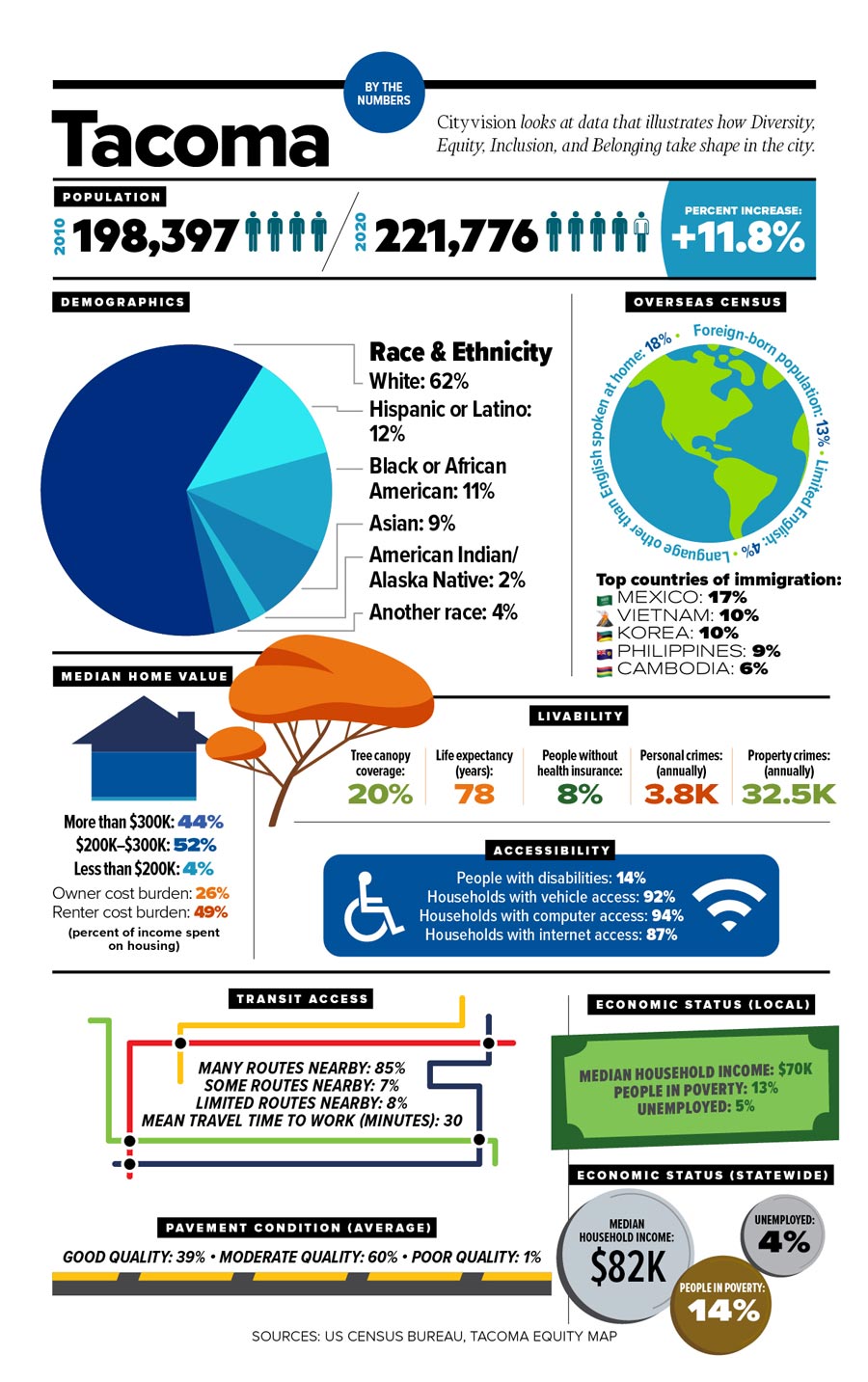by
<a href="mailto:communicationsteam@awcnet.org">Communications</a> | Jun 16, 2023
Tacoma Mayor Victoria Woodards (she/her) talks about the holistic benefits of DEIB + Diversity, equity, inclusion, belonging, plus collaboration.
Interview by: Sarah Chase Shaw
Tacoma Mayor Victoria Woodards (she/her) talks about the holistic benefits of DEIB + Diversity, equity, inclusion, belonging, plus collaboration.
Q: You’re a Tacoma native. Tell us a bit about your history here.
A: Public service is in my blood, and Tacoma has been my home for as long as I can remember. While I was in high school and everyone else was preparing to go to college, nobody talked to me about that possibility. I ended up taking Junior ROTC as an elective—and the next thing I knew, I had signed up for the U.S. Army. I thought it would be a good opportunity for me to serve my country and see the world. Well, to my great surprise, after completing basic training on the East Coast, I ended up being stationed right back at home in Tacoma. A few years after I left the Army and was working in corporate America, I decided to change course and go to college.
And then I got a call that changed my life—I was invited to apply for a job at the Tacoma Urban League. It was there that I found my true calling for community service—and where I first met some of Tacoma’s most iconic civil rights leaders. One of those leaders was Harold Moss, Tacoma’s first African American city councilmember, mayor, and county councilmember. He gave me a great opportunity to work for him, and he quickly became not just my boss, but my mentor, and eventually, the man I would call my father. I eventually would become president of the Tacoma Urban League, which was pivotal to how I lead to this day and how I shaped my understanding of our community’s most pressing needs.
“Public service is in my blood, and Tacoma has been my home for as long as I can remember.”
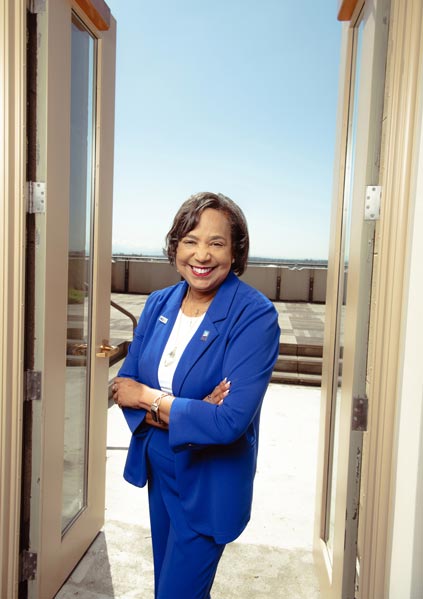
City of Tacoma Mayor Victoria Woodards at Tacoma City Hall
Credit: Photo by Daniel Berman
Q: Is that what led you to local government?
A: I guess you could say that. My time with Harold and the Urban League shaped how I saw public service. I was appointed as a parks commissioner and was later elected to that seat. There, I discovered that not only did I have a passion for public policy, I also had a gift. I believe that when you’re given a gift, you have an obligation to use that gift to help others. So, after five years as parks commissioner, I ran for city council and then for mayor.
As mayor, I continue to build on the work I did at the helm of the Tacoma Urban League, championing equity issues and anti-racist systems transformation in Tacoma. In doing so, I have also expanded my involvement in regional and national efforts related to issues that extend beyond Tacoma’s city limits—homelessness and affordable housing, public safety, support for youth and families, growing local business, and the creation of family wage jobs. As complex as local government is, nothing we are seeing in Tacoma is unique and, as we continue working to address the challenges we face, it is critical that we are also well-represented both regionally and nationally and look at these challenges through that broader lens.
Q: You are the second African American woman to serve as mayor of the city. Does your current council reflect the diversity of Tacoma’s community?
A: Yes, the first was Marilyn Strickland, who now represents Washington State’s 10th Congressional District on the U.S. House of Representatives. When my term is up, we will have had 16 straight years of Black female leadership. As incredible as this sounds, we also currently have the most diverse city council in the history of Tacoma. We now have six women, and five councilmembers are people of color. Even beyond that, we have one of the youngest councils, and representation by parents with children in our school system. Our city council truly does represent the diversity of Tacoma’s community.
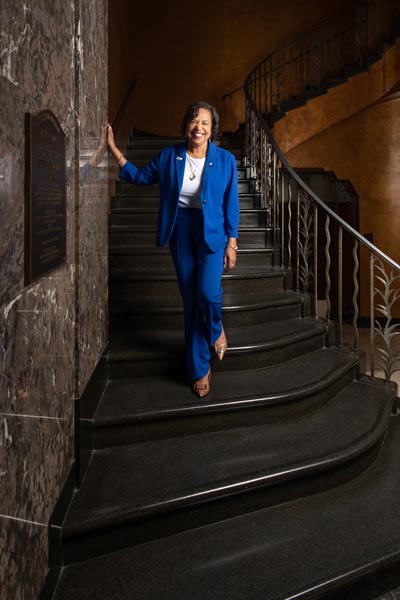
City of Tacoma Mayor Victoria Woodards at Tacoma City Hall
Credit: Photo by Daniel Berman
Q: What role has equity played in your administration?
A: In 2020, my council colleagues and I adopted Resolution 40622, affirming our dedication and commitment to comprehensive and sustained transformation of all the institutions, systems, policies, practices, and contracts impacted by systemic racism. We began this work in 2014, when we established our Office of Equity and Human Rights, as well as our Commission on Immigrant and Refugee Affairs. In 2015, we also adopted Resolution 39116, authorizing the City of Tacoma’s membership in the Welcoming Cities and Council Initiative, a network of over 40 localities nationwide which encourages communities to create more welcoming, immigrant-friendly environments that maximize opportunities for economic growth and vitality. In 2022, we passed Ordinance 28866, which recognizes our Office of Equity and Human Rights as a leader in the City of Tacoma’s transformation efforts, and codifies the office, as well as the responsibilities of the city manager, to ensure continuation of this vital work in the years to come.
Q: How do you define equity?
A: Equity is fairness and access to the same opportunities for all, regardless of race, ethnicity, gender, sexual orientation, or socioeconomic status. It is a concept that recognizes people have different needs and circumstances, and that they may require different levels of support to achieve their goals.
Q: How so?
A: I like to use streetlights as an example. It used to be that you had to pick up the phone and ask for your streetlight to be fixed in Tacoma. That’s sometimes hard for people in historically underserved communities to do, for a multitude of reasons. Some may not be comfortable engaging with government, while some may be too busy working to ensure that they can provide their family with basic necessities.
The city was initially only repairing streetlights in areas that generated complaints. But when we looked at what was going on through an equity lens, we realized that approach would not serve the needs of all of our community members in the long term. We recognized a need to focus our funding in a more strategic manner with that long-term vision in mind.
Through our Equity Index we were able to evaluate where residents were facing lower opportunities to succeed and combine that data with crash data and crime that the department was already tracking for street light repair and prioritize street light replacement across the city based on several equity factors.
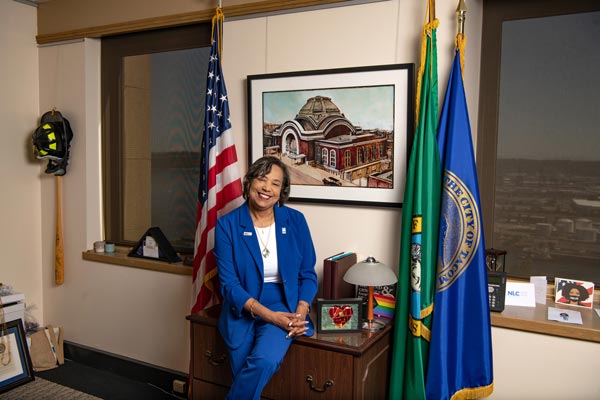
City of Tacoma Mayor Victoria Woodards at Tacoma City Hall
Credit: Photo by Daniel Berman
Q: As president of the National League of Cities (NLC) you’ve had success with an investment strategy you dubbed the P3 Initiative. What is that?
A: It’s simple. People plus partnerships equals endless possibilities. I believe that when you invest in people, and you engage them in meaningful partnerships, there is no limit to what you can achieve. It’s only when our people come together and share their ideas that we can truly foster innovation and build better communities. Creating those partnerships that bring our residents together is one of our most important jobs as local leaders. Community-centered partnerships that draw on the innovation of our residents—and use the expertise of local partners, businesses, community organizations, and others to address our shared needs—are so important.
“It’s simple. People plus partnerships equals endless possibilities. I believe that when you invest in people, and you engage them in meaningful partnerships, there is no limit to what you can achieve.”
Q: How will that work?
A: Well one example, through a partnership with the U.S. Department of Labor, we launched the Good Jobs, Great Cities Academy. The Good Jobs, Great Cities Academy includes 16 cities working throughout 2023 and 2024 to develop innovative and scalable city-supported solutions that upskill and reskill workers into quality, high-demand jobs in infrastructure, clean energy, and advanced manufacturing jobs made possible by new federal investments, with a focus on supporting residents from historically underserved and underrepresented communities in order to address key shortcomings in their education and workforce ecosystem. And to be honest, most workforce conversations right now center around infrastructure because that’s where the federal money and programs are—for building bridges and fixing roads and building future infrastructure in the green jobs space.
Q: And what about housing?
A: NLC and the American Planning Association are working together, in coordination with the private sector, to address cities’ housing needs and the ongoing harm stemming from discriminatory policies like redlining. We’re doing this through our Housing Supply Accelerator, which is a suite of resources, benchmarks, tools, and technical assistance focused on helping local governments, builders, and financial institutions re-envision and align their policies and procedures related to homebuilding for people at all levels of income. We are sponsoring regional meetings with agencies, community, and private companies and banks to talk about what it’s going to take to create more affordable housing and how can the federal government help us. What works in Tacoma may not work in Florida or Chicago, but the reality is that the public and private sectors need to collaborate to understand what each needs to succeed.
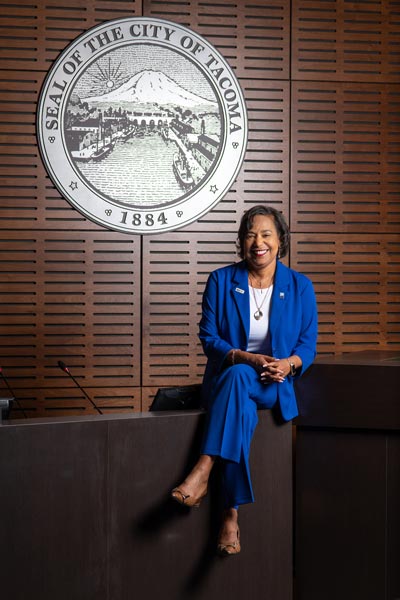
City of Tacoma Mayor Victoria Woodards at Tacoma City Hall
Credit: Photo by Daniel Berman
Q: How does equity fit into your P3 initiative?
A: Unemployment may be at its lowest rate, but if you look at who’s unemployed, it’s primarily the BIPOC population. And as it relates to affordable housing, the reality is that less than half of white Americans identify housing as a major concern as compared to 57 percent of African Americans and 55 percent of Hispanic and Asian Americans. If these partnerships and initiatives are really going to help our communities, we have to focus on those facing the highest barriers and who have already been systemically excluded from building generational wealth through jobs, housing, and more.
Q: What’s one thing that you think every city, however big or small, should be doing when it comes to this work on diversity, equity, inclusion, and belonging?
A: Every city should be doing an evaluation of its staff and hiring so that it looks like the city it is serving. Every city also should be doing an evaluation of its services, making sure that you’re not just spreading peanut butter evenly over the sandwich, but making sure that areas that need more investment are getting more investment. Equity is also about removing barriers for those most challenged, and when we help them, we help everyone else. A rising tide lifts all boats, and I absolutely believe that.
“A rising tide lifts all boats, and I absolutely believe that.”
Tacoma: By the numbers
